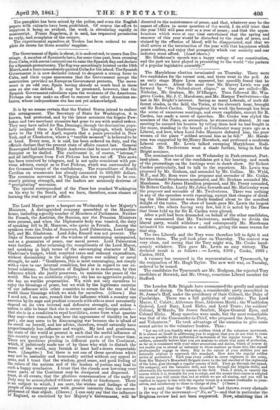The Lord Mayor gave a banquet on Wednesday to her
Majesty's Ministers. A distinguished company assembled at the Mansion- house, including a goodly number of Members of Parliament. Neither the French, the Austrian, the Russian, nor the Prussian Ministers were present, and when the Diplomatic body was toasted, the duty of speaking fell to M. Musurus, who spoke in French. Among the speakers were the Duke of Somerset, Lord Palmerston, Lord Camp- bell, and Mr. Gladstone. Lord John Russell was not present. The Duke of Somerset spoke of the wisdom of maintaining unimpaired, and as a guarantee of peace, our naval power. Lord Palmerston went further. After returning the compliments of the Lord Mayor, and speaking in high terms of the encouraging character of Mr. Gladstone's budget, which remitted taxes and reduced expenditure, without diminishing in the slightest degree our military or naval strength, he said : ` Gentlemen, this is most encouraging, not simply with a view to our internal condition, but also in regard to our ex- ternal relations. The function of England is to endeavour, by that influence which she justly possesses, to maintain the peace of the world. She has no ambitious objects ; she has no aggressive policy; she has no warlike propensities. We wish not only ourselves to enjoy the blessings of peace, but we wish by the legitimate exercise of our influence with other countries to secure for the rest of the world those blessings which we wish for ourselves. (Cheers.) But I need not, I am sure, remark that the influence which a country can exercise by its sage and prudent counsels with others must necessarily depend on its own internal and defensive strength, and unless a nation is able to boast that she is secure against any foreign attack— that she is in a condition to repel hostilities, come from what quarter they may—her counsels may bear the appearance of timidity on her part ; she may seem to be discouraging war because she is afraid of its recoil on herself, and her advice, therefore, would naturally have proportionately less influence and weight. My lord and gentlemen, the state of the world at present is such that the useful influence of this country may perhaps be as well exercised as at any former time. There are questions pending in different parts of the Continent, which, if judiciously made use of by those who wish to disturb the Peace of the world, may furnish at least half a dozen respectable wars. (Laughter.) Yet there is not one of those questions which may not be amicably and honourably settled without any appeal to arms, and I trust that the wisdom, good sense, and good feeling of the rulers of the nations and of the leaders of parties may lead to such a happy conclusion. I trust that the clouds now lowering over some parts of the Continent may be dissipated and dispersed. I trust, at all events, that the glorious consummation of the unity of Italy may be accomplished without any check or hinderance. There is no subject to which, I am sure, the wishes and feelings of the people of this country point with greater intensity than the accom- Plishment of that object. (Cheers.) I can only say that the influence of England, as exercised by her Majesty's Government, will be directed to the maintenance of peace, and that, whatever may be the aspect of affairs in some quarters of the world, I do still trust that the year 1861 will pass over as a year of peace; and that the appre- hensions which were at one time entertained that the spring and summer of this year would be disturbed by the clash of arms, and stained by the effusion of blood, will be disappointed, and that we shall arrive at the termination of the year with that happiness which peace confers, and enjoy that prosperity which our security and our industry must afford. (Load cheers.)
Mr. Gladstone's speech was a happy eulogy of our constitution, and the part we have played in presenting to the world "the pattern of a popular legislative assembly."






























 Previous page
Previous page